Disclosure: Meeple Mountain received a free copy of this product in exchange for an honest, unbiased review. This review is not intended to be an endorsement.
The Meeple Mountain team loved 2018’s Raccoon Tycoon, a commodities pricing manipulation game with a little engine building, fantastic artwork and a somewhat family-friendly approach that was great for newer gamers as well as more seasoned hobbyists.
Lizard Wizard, also from Glenn Drover and Forbidden Games, builds on Raccoon Tycoon and adds additional elements and a bit more strategy, along with reskinned artwork by the same artist, Annie Stegg Gerard. Lizard Wizard is set in the land of Astoria—the same setting as Raccoon Tycoon—but this time around, you aren’t auctioning off railroads…it’s lizards!!
And as long as you have poker chips to replace the base game’s currency, you are going to love Lizard Wizard a bunch. This is a fantastic update to an already solid foundation!
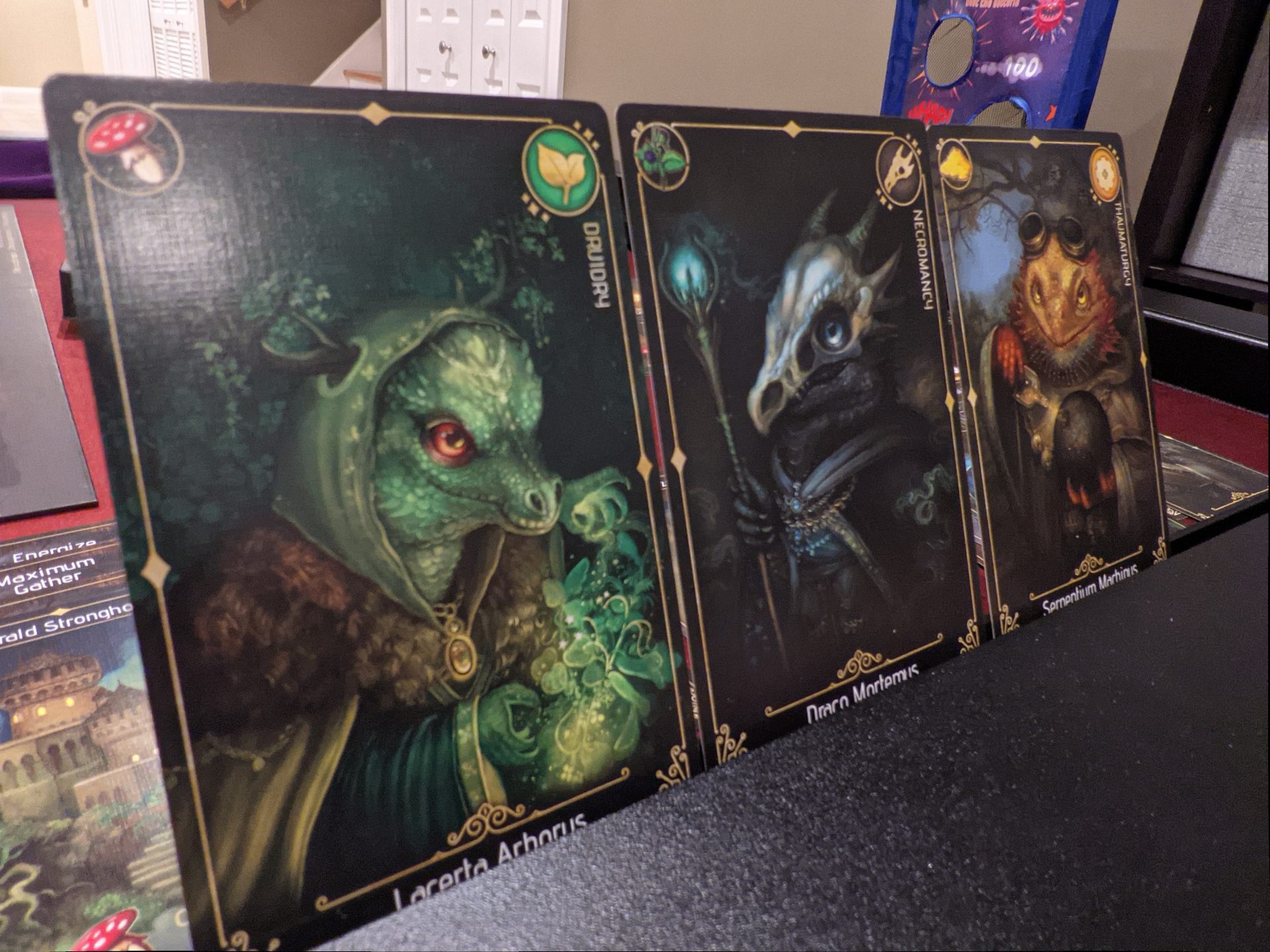
An Auction/Market Manipulation/Engine Building/Press Your Luck Game Featuring…Wizards?
One look at the cards and game board of Lizard Wizard, and one thing quickly becomes clear: this is a game about money.
Sure, the game calls money “mana”, a word I’m used to seeing in RPG settings when you are collecting resources to cast spells. In Lizard Wizard, you’ll use mana to buy spells, to buy “Familiars”, to bid up wizards available at auction in a “wizard’s duel”, and when you sell one of the 7 resources in the game at market.
Mana equals money. And this is a good thing.
Lizard Wizard is a resource collection game which thrives when players optimize their resource collection engine. It is vital to sell resources at just the right time to make the most money, which makes every single other thing in the game easier.
There are plenty of things to do, as you can choose one of 6 main actions on a turn:
- Gather resources known as Reagents, which have cool names like Mandrake, Eyes of Newt, and Toadstool. (Hmm…do I really want something called Toadstool???)
- Sell resources, for prices which fluctuate throughout the game based on a card system that dictates which stuff you can collect and which stuff gets more valuable.
- Cast spells, which grant one-time or ongoing powers, destroy opponent cards, or grant end-game scoring bonuses
- Buy Towers, which increase resource storage capacity
- Buy Familiars which, like Towers, get more expensive as the game progresses and potentially grant set-collection bonuses. But they also let you enter a dungeon where you can press your luck: drawing cards to see if a treasure or a monster shows up. As long as you reveal one monster or less, you get to keep all the treasure you find. Reveal two monsters, however, and you go bust, losing all treasure cards you uncovered during the crawl.
- Start auctions, where you will bid up available Wizards which give owners minor resource-gathering bonuses that become critical as you maximize your efficiency throughout the game.
In some ways, Lizard Wizard is a sandbox game for people who love money (sorry, mana). In other ways, it’s an engine builder that allows a savvy investor to use mana to buy spells which grant the player ongoing powers. And there are even options to make it a stabby “take that” game with some spells that disintegrate cards in another player’s tableau. Plus, each game of Lizard Wizard features 4 public goals that can be achieved by a player on their turn when they have collected a certain number of cards from one specific school of magic, 7 of a specific resource, or other set collection tasks.
Lizard Wizard has an interesting end game condition: when one of the 4 main decks of cards are depleted, that triggers the final round of play that allows for everyone getting an equal number of turns. Those decks are scaled based on player count.
Points are earned based on building pairs of Wizards and Towers, Spells that match the suit of any aligned Wizard-Tower pairs, gold, public goals, most treasure obtained, and any Spells that feature end-game scoring goals.
Whoever has the most points wins. The tiebreaker? You guessed it. Mana. (I just love when the game uses a tiebreaker that fits into the key to winning!)
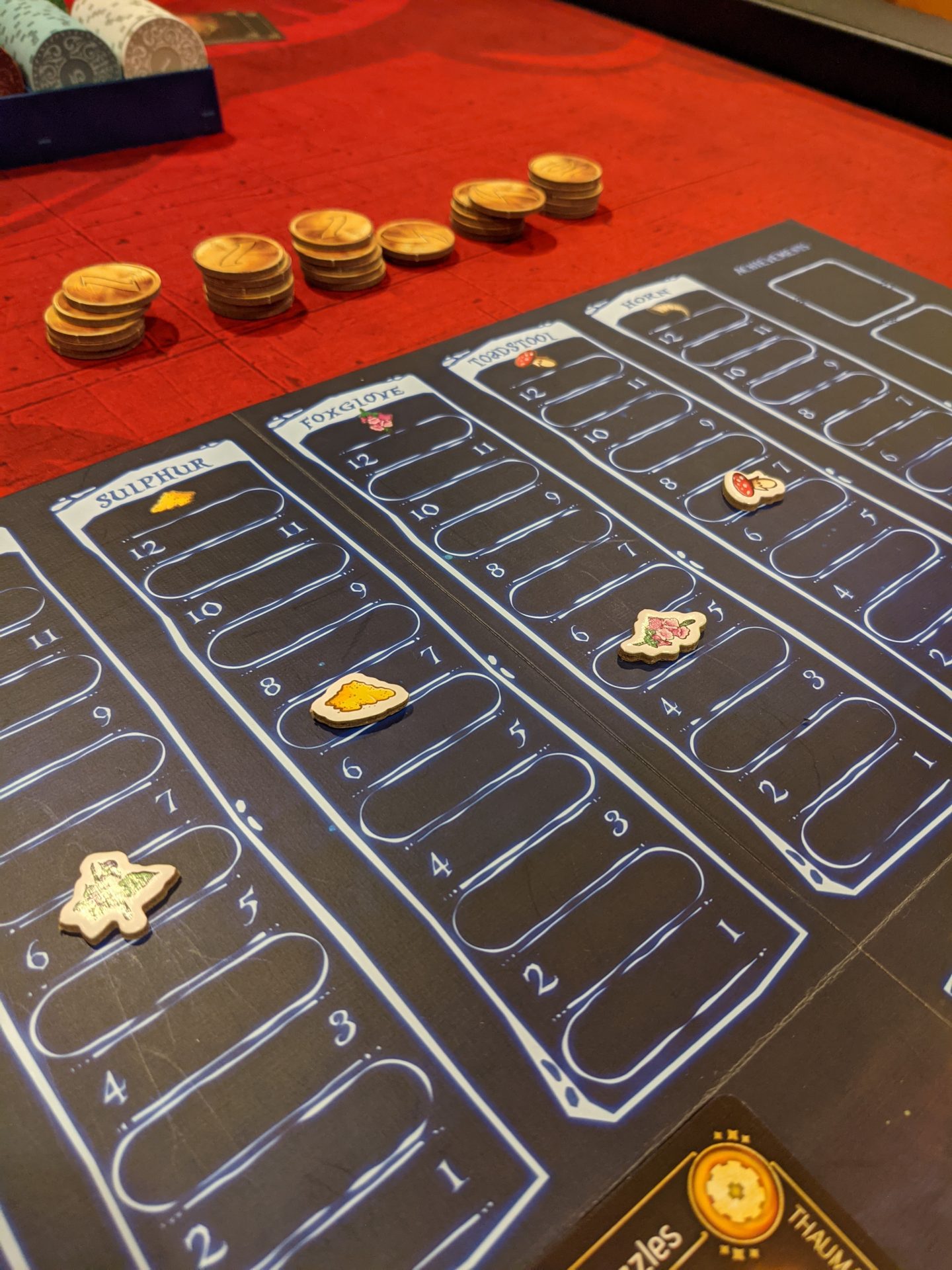
Quick, Fun, Interactive, and Lots of Paths to Victory!
Despite the near-comical amount of things going on in Lizard Wizard, it’s a mid-weight experience that only needs the back page of its manual to teach the entire game.
Understanding how to manipulate the resource market is not difficult. You don’t even have to know investment basics like “buy low, sell high.” Gathering resources is as simple as playing a card, so you really just have to stay in front of the competition to sell before someone else sells their horde of, say, Foxglove;gutting the price of it before your next move.
The iconography on the cards is very straightforward. Additionally, most of the cards in Lizard Wizard are tarot card size meaning seeing all of the cards you need from across a large table is really easy. Big ups to the design team for the call on tarot cards; it does make the game a massive table hog even at 3 players, but it’s worth it to monitor what other players are doing.
Explaining the end-game conditions is important to ensure players know how to pair Wizards and Towers from the same school of magic to maximize potential. Doubling down on these sets by only casting spells in sets where you have a matching Wizard/Tower pair can really spike your score.
In one game, I earned 42 points just in gold thanks to a strategy of buying as many cards as I could throughout the game in a single suit. In that game, I also got a bunch of additional gold because of a spell that granted a fun ongoing power: buying Wizards and Familiars got me even more gold! This dream didn’t last, thanks to one of those take-that spells I mentioned earlier. (Every good dream evaporates eventually.)
Going into the dungeon is a real risk with great rewards, but it’s so simple that I was going into the dungeon mainly to be my best Vegas self. I busted 4 times in a row before finally revealing enough treasure to make that move worth it, but what can I tell you? I just love press-your-luck games. (Sidebar: I also miss the TV game show “Press Your Luck.” Being old is tough sometimes.)
In another game, a player got 3 of the 4 Achievements to coast to victory. In another, one player had a Spell with an end-game boost of 3 points per unique Wizard…and he had all 7 unique wizards. Pairing that with a killer Tower combination, the points came in waves. There’s plenty of ways to get those points in Lizard Wizard!
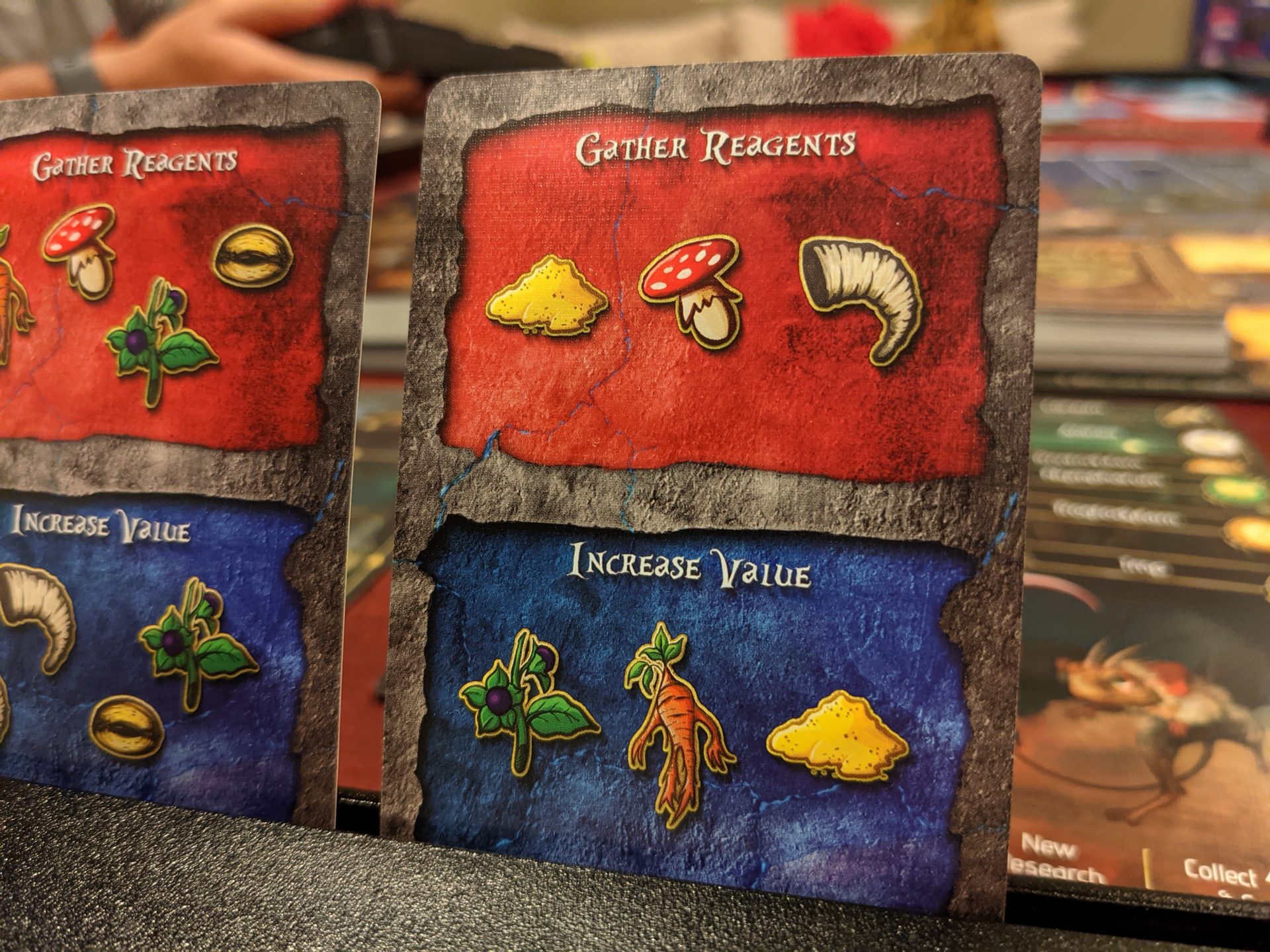
OK, OK. What Are the Negatives?
Fair. I have one major criticism and a minor one for Lizard Wizard.
The major one? The game is too long; my 3-player games have lasted between 90 minutes and just over 2 hours, long for this type of game and the low complexity of the actions. In fact, depending on your playgroup and the number of players at the table, it is WAY too long.
My first play was with 3 players. This is probably the best number to play the game with, because you don’t have to wait long between turns of any type. Auctions remain interesting, you can count on some of the cards still being available when you reveal new ones on the market after your turn, and (maybe most importantly) the game will definitely fit on a normal table at that player count.
And, even then, the game can only end when one of the four decks is emptied. The easiest deck to empty in my experience is the Towers deck because the cost of those cards is very reasonable (in a 2-player game, those cards at most will cost two resources or 2 gold coins)—but you would never independently rush the Towers deck unless you had Wizards to go along with them.
So, if you are doing a variety of actions, that means you are going to have to clear out a deck with a minimum of 14 cards in it. Even when you think you have a good lock on the highest score, you’re going to have to plow through some other cards to get to the last round. Conservative players will absolutely try to slow the game down and min/max late-game turns to try and find more Spell cards that add to end-game scores or match up Towers with Wizards.
Lizard Wizard has a lot of interesting things going on, but when you are just trying to empty a deck, finishing the game is a bit of a drag. In both of my first 2 games of Lizard Wizard, we all collectively agreed to just bid on the last 3 Wizards on consecutive turns to bring the game to a close. Not the most interesting climax.
The minor issue: Lizard Wizard completely whiffs on a couple of vital administrative tasks. Cheat sheets/player aids of the 6 available actions would be easy to list on a double-sided tarot card, but they are not provided. The back of the instruction manual mostly serves this purpose, but passing the manual around between 5 new players is a pain.
In addition, Lizard Wizard badly needs an end-game score pad. Counting up points from Wizard-Tower pairs and associated Spell cards, Spells that have end-game scoring goals…this would just be easier to manage with a pad. Less-complicated games than this one usually have pads or easy ways to track points on the board, but Lizard Wizard has neither.
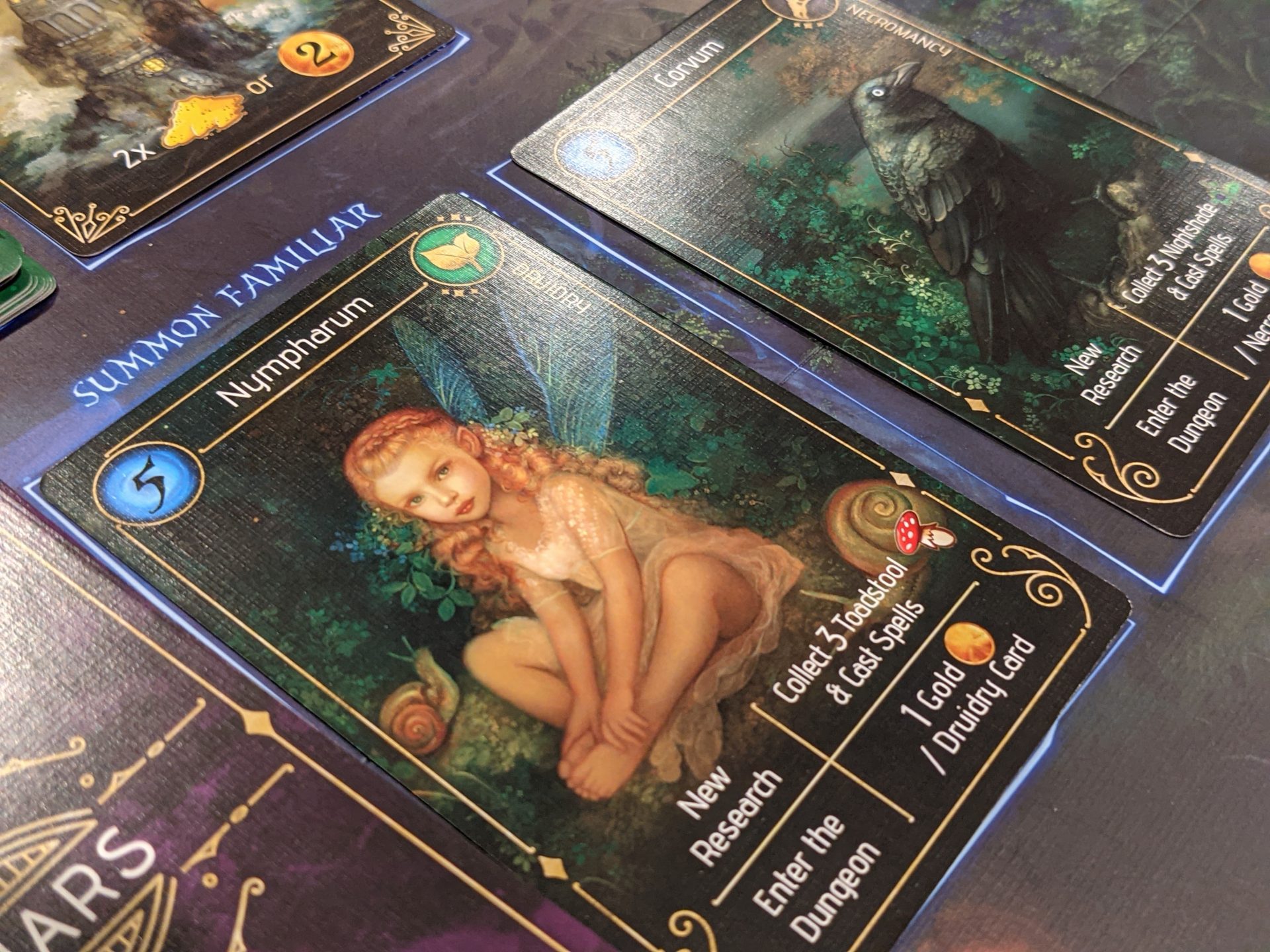
Still – I Really Enjoyed This Game!
Despite these issues Lizard Wizard is a blast, particularly if you get a collection of players who love stock games, interactive gameplay, and straight-up gambling on certain actions. I mention this because playing Lizard Wizard with a bunch of conservative players who are money-conscious won’t make some of the most important elements very interesting. A large component of the game is the Wizard auction, and it was fun going up against other players to try and acquire cards—as long as they are game to go for broke. (Mana is secret in Lizard Wizard so you don’t always have a good sense of everyone else’s finances.)
The production of Lizard Wizard is fantastic; the card stock is great, the insert is amazing, the variety of spells in the Spell deck is deep and there are 20 Achievements included in the box for variability in the setup. The quality of the mana coins is a miss, but as I mentioned earlier, I used poker chips for my plays. The 7 resources are all cut differently and make it easy to tell what everyone is currently holding; one of the players in my review crew thought it would be better to just use wooden cubes instead of cardboard tokens, but I politely disagree. The resource tokens add a little something extra to the gameplay.
If you already own Raccoon Tycoon, it’s a tough call on whether you need to add Lizard Wizard to your collection. I have not played Raccoon Tycoon, but in reading its rules, Lizard Wizard provides just enough more to fit my needs. If you are going to be playing one of these games mostly with your family, I think Raccoon Tycoon is the best fit.
Lizard Wizard is an excellent mid-weight game, just a few notches short of perfection. I’m fired up to get this back to the table!


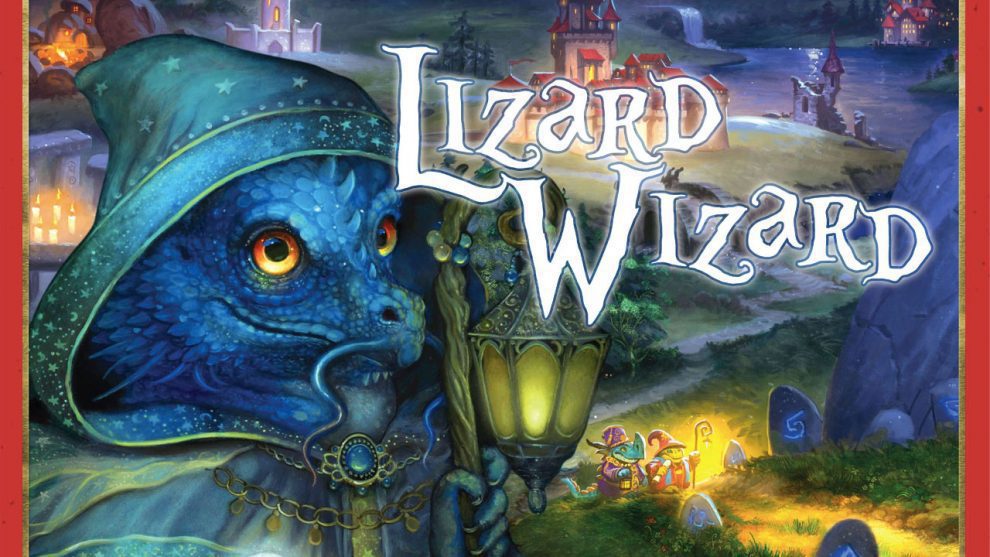




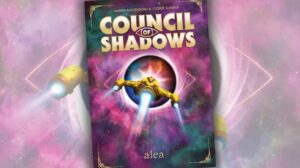




Add Comment